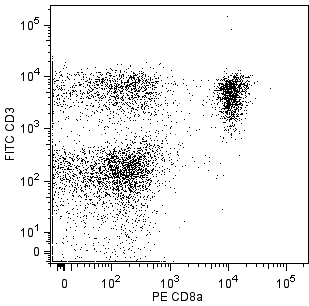-
Training
- Flow Cytometry Basic Training
-
Product-Based Training
- BD FACSDiscover™ S8 Cell Sorter Product Training
- Accuri C6 Plus Product-Based Training
- FACSAria Product Based Training
- FACSCanto Product-Based Training
- FACSLyric Product-Based Training
- FACSMelody Product-Based Training
- FACSymphony Product-Based Training
- HTS Product-Based Training
- LSRFortessa Product-Based Training
- Advanced Training
-
- BD FACSDiscover™ S8 Cell Sorter Product Training
- Accuri C6 Plus Product-Based Training
- FACSAria Product Based Training
- FACSCanto Product-Based Training
- FACSLyric Product-Based Training
- FACSMelody Product-Based Training
- FACSymphony Product-Based Training
- HTS Product-Based Training
- LSRFortessa Product-Based Training
- United States (English)
-
Change country/language
Old Browser
This page has been recently translated and is available in French now.
Looks like you're visiting us from {countryName}.
Would you like to stay on the current country site or be switched to your country?


.png)

Two-color analysis of the expression of TCR Vβ3 on peripheral lymphocytes. C57BL/6 lymph node cells were incubated simultaneously with FITC Hamster Anti-Mouse TCR Vβ3 (Cat. No. 553208), PE Rat Anti-Mouse CD4 (Cat. No. 553048/553049), and PE Rat Anti-Mouse CD8a (Cat. No. 553032/553033) monoclonal antibodies. The fluorescence contour plot was derived from gated events based on the forward and side light-scattering of viable lymphocytes. Flow cytometry was performed on a BD FACScan™.
.png)

BD Pharmingen™ FITC Hamster Anti-Mouse TCR Vβ3
.png)
Regulatory Status Legend
Any use of products other than the permitted use without the express written authorization of Becton, Dickinson and Company is strictly prohibited.
Preparation And Storage
Recommended Assay Procedures
For flow cytometry of cell suspensions from peripheral lymphoid tissues, it is recommended that multicolor staining be performed to distinguish T lymphocytes from non-T cells.
Product Notices
- Since applications vary, each investigator should titrate the reagent to obtain optimal results.
- An isotype control should be used at the same concentration as the antibody of interest.
- Caution: Sodium azide yields highly toxic hydrazoic acid under acidic conditions. Dilute azide compounds in running water before discarding to avoid accumulation of potentially explosive deposits in plumbing.
- Although hamster immunoglobulin isotypes have not been well defined, BD Biosciences Pharmingen has grouped Armenian and Syrian hamster IgG monoclonal antibodies according to their reactivity with a panel of mouse anti-hamster IgG mAbs. A table of the hamster IgG groups, Reactivity of Mouse Anti-Hamster Ig mAbs, may be viewed at http://www.bdbiosciences.com/documents/hamster_chart_11x17.pdf.
- For fluorochrome spectra and suitable instrument settings, please refer to our Multicolor Flow Cytometry web page at www.bdbiosciences.com/colors.
- Please refer to http://regdocs.bd.com to access safety data sheets (SDS).
- Please refer to www.bdbiosciences.com/us/s/resources for technical protocols.
Companion Products


.png?imwidth=320)
.png?imwidth=320)

.png?imwidth=320)
The KJ25 antibody specifically reacts with the Vβ 3 T-cell Receptor (TCR) of strains having the a (e.g., C57BR, SJL), b (e.g., AKR, CBA/Ca, C57BL, DBA/1), and c (e.g., RIII) haplotypes of the Tcrb gene complex. Vβ 3 TCR-bearing T lymphocytes are clonally eliminated either completely or partially in mice expressing superantigens encoded by the Mtv-1 (Mls-4[a], Mls[c]), Mtv-3 (Mls[c]), Mtv-6 (Mls-3[a], Mls[c]), Mtv-13 (Mls-2[a], Mls[c]), Mtv-27, Mtv-44, and/or Mtv-MAI endogenous proviruses (e.g., A, BALB/c, CBA/J, C3H/He, DBA/2, NZB, NZW). Vβ 3 TCR-bearing T cells are activated by the superantigenic Staphylococcal Enterotoxins A and B. Activation or elimination of Vβ 3 TCR-expressing T cells by these determinants is partially dependent upon presentation by I-E. This hamster mAb to a mouse leukocyte antigen does not cross-react with rat leukocytes.

Development References (8)
-
Fairchild S, Rosenwasser OA, Dyson PJ, Tomonari K. Tcrb-V3+ T-cell deletion and a new mouse mammary tumor provirus, Mtv-44. Immunogenetics. 1992; 36(3):189-194. (Biology). View Reference
-
Hodes RJ, Abe R. Mouse endogenous superantigens: Ms and Mls-like determinants encoded by mouse retroviruses.. Curr Protoc Immunol. 2001; Appendix 1:Appendix 1F. (Biology). View Reference
-
McCormack JE, Callahan JE, Kappler J, Marrack PC. Profound deletion of mature T cells in vivo by chronic exposure to exogenous superantigen. J Immunol. 1993; 150(9):3785-3792. (Biology). View Reference
-
Pullen AM, Marrack P, Kappler JW. The T-cell repertoire is heavily influenced by tolerance to polymorphic self-antigens. Nature. 1988; 335(6193):796-801. (Immunogen). View Reference
-
Tomonari K, Fairchild S, Rosenwasser OA. Influence of viral superantigens on V beta- and V alpha-specific positive and negative selection. Immunol Rev. 1993; 131:131-168. (Biology). View Reference
-
Tomonari K, Fairchild S, Rosenwasser OA. Tcrb-V3+ T-cell deletion and a mouse mammary tumor provirus, Mtv-27. Immunogenetics. 1992; 36(5):302-305. (Biology). View Reference
-
White J, Herman A, Pullen AM, Kubo R, Kappler JW, Marrack P. The V beta-specific superantigen staphylococcal enterotoxin B: stimulation of mature T cells and clonal deletion in neonatal mice. Cell. 1989; 56(1):27-35. (Biology). View Reference
-
Yuuki H, Yoshikai Y, Kishihara K, et al. Deletion of self-reactive T cells in nude mice grafted with neonatal allogeneic thymus. J Immunol. 1990; 144(2):474-479. (Biology). View Reference
Please refer to Support Documents for Quality Certificates
Global - Refer to manufacturer's instructions for use and related User Manuals and Technical data sheets before using this products as described
Comparisons, where applicable, are made against older BD Technology, manual methods or are general performance claims. Comparisons are not made against non-BD technologies, unless otherwise noted.
For Research Use Only. Not for use in diagnostic or therapeutic procedures.
Report a Site Issue
This form is intended to help us improve our website experience. For other support, please visit our Contact Us page.